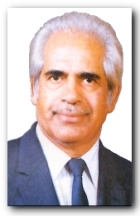 Gopal Ganesh Chitnis was born on the 16th of December, 1928 in Tadsinhal, a small village in the Chandgad District of Maharashtra.
Gopal Ganesh Chitnis was born on the 16th of December, 1928 in Tadsinhal, a small village in the Chandgad District of Maharashtra.
Very early in his life, he showed signs of the drive and determination that would become his trademark characteristic. In an era when any form of education was deemed as optional, he fought the odds that were against him and completed his primary and secondary education.
In 1948 he decided that there was more to learn, and decided to join the College of Engineering in Pune, which he did despite all the odds of a poor village boy ever doing so. In 1952, he successfully completed his course in Mechanical and Electrical Engineering.
At this point, he set himself another challenge – to continue his education in London and to gain work experience there. With the help of a loan of Rs.200 from Shri Baburao Pusalkar, he set On the 4th of September 1952, this village boy landed in London, where he proceeded to work and study, eventually earning his Higher National Certificate from the Hendon Technical College in 1955.
Thereafter, he joined AEG Germany as a Trainee Engineer, rising to be a Project Engineer in the newly formed Rourkela Cell at AEG.
In 1957, he left AEG to start his own import/Export and Consultancy business, focussing on the Oil Hydraulic line. As a side business, he decided to enter the tape-recorder business, and at the age of thirty became the youngest tape-recorder manufacturer in the world.
In 1959, he met his benefactor Baburao Pusalkar again in Germany, and arranged a collaboration with Vogel & Co. for him, for the manufacture of hydraulic presses – the first of its kind in India.
In 1961 he married Monika Barthel, his erstwhile secretary. A German by birth, she was the ideal partner in his career, and has has stood by him through thick and thin ever since.
Through the 60′s, he continued his businesses, focussing more and more on the import and export of engineering goods. But the urge to return to India and get into the manufacture of hydraulics became stronger and stronger, more so with the birth of his two sons, whom he wanted to raise in an Indian environment. In 1969, he returned to India after almost eighteen years in Europe. In 1972, his wife and sons followed him to settle in India.
In 1970, he established his first unit – Standard Hydraulik (India) – in Belgaum, a city not far from his village. This firm was followed by more and more such units – each one focussing on a particular field in oil hydraulics, such as Hydrokraft for presses, Hyguri Hydraulik for hydraulic motors, Chitnis Machine tools for hydraulic application machinery, etc.
His hydraulic pumps, valves, presses and other hydraulic machinery can be found all over India and across the world. His constant innovations and design improvements gave rise to hydraulic equipment his customers swear by. And his vast knowledge in the field made him a much sought-after consultant in the field of hydraulics.
The Government of India recognised his efforts by awarding him the much coveted Udyog Patra, considered to be the “Industrial Nobel Prize” in India.
Mr.Chitnis traveled often. Not content sitting on his laurels, he could be found wherever the action was – just like that boy back in in the 1930′s in the small village of Tadsinhal in India – the little boy who stood up and said:
“I can!”
He spent his later years in retirement, often spending time in the villages that he grew up in, only to emerge with new ideas that he was always keen to discuss with people who wanted to follow in his footsteps.
Mr.Chitnis passed away on April 6th, 2009, leaving behind a rich legacy of industrial development and advancement that he could rightfully claim credit to.